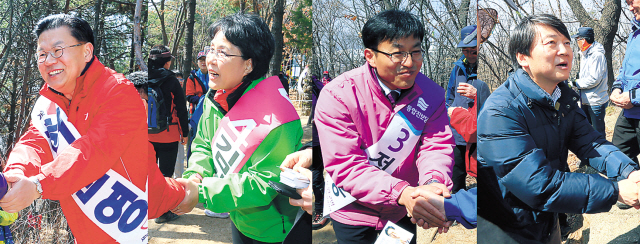Former presidential candidate Ahn Cheol-soo is leading the race for the Nowon C constituency in the April 24 by-elections, but his victory would spell uncertainty for the progressive bloc.
With the main opposition Democratic United Party opting not to field a candidate for the Seoul constituency, Ahn is up against former police chief Huh Joon-young of the Saenuri Party, and candidates from the minor opposition Progressive Justice Party and the Unified Progressive Party.
The PJP’s candidate is Kim Ji-seon, and Jung Tae-heung is running as the UPP candidate.
Kim is the wife of Roh Hoe-chan, whose ejection from parliament after being convicted of disclosing illegally obtained information has left the Nowon C seat vacant.
With the main opposition Democratic United Party opting not to field a candidate for the Seoul constituency, Ahn is up against former police chief Huh Joon-young of the Saenuri Party, and candidates from the minor opposition Progressive Justice Party and the Unified Progressive Party.
The PJP’s candidate is Kim Ji-seon, and Jung Tae-heung is running as the UPP candidate.
Kim is the wife of Roh Hoe-chan, whose ejection from parliament after being convicted of disclosing illegally obtained information has left the Nowon C seat vacant.

With Kim and Jung presenting little competition, Ahn is in effect running against Huh, but he appears to have a solid lead with surveys putting him between 6 and 16.2 percentage points ahead of Huh.
In a survey conducted by Realmeter on March 26, Ahn led Huh by 6 percentage points with 38.8 percent support. A survey conducted by a local daily, however, put Ahn’s support at 40.5 percent and that of Huh at 24.3 percent.
While the DUP’s Lee Dong-sup has declared support for Ahn after forfeiting the race for the seat, Ahn’s win would bring a mixed bag of results for the main opposition.
With the DUP having declared that it will use the by-elections to raise “alarm and warn” the government, Ahn’s victory would serve to further its cause of keeping the Park Geun-hye administration and the ruling party in check.
However, Ahn entering the parliament is seen as a key stepping stone for the founding of his own party, which would pose a significant threat to the DUP.
According to a recent survey conducted by Gallup Korea, the DUP’s support rating would be halved should Ahn create a party.
Asked which party they would support if Ahn launched an independent party, 23 percent of the respondents chose the new party while only 11 percent said they would back the DUP.
The so-called “Ahn-effect” appears to have taken hold even in the Jeolla provinces, the DUP’s traditional stronghold. In a recent survey conducted in the region, 42.8 percent of the respondents said they would support a candidate from Ahn’s party in the provincial elections scheduled for next year. In comparison, only 28.2 percent said that they would support the DUP candidate.
At least publicly, the DUP is playing down the potential impact of Ahn’s rise within the political arena.
“The DUP is a constant. If a new party is formed, it will be a third party. It is romanticism to think that lawmakers will rush to join,” Rep. Moon Hee-sang, the DUP emergency committee chairman, was quoted as saying by a local daily.
“There is a no reason for it to become larger than us. If it expands then it will mean mutual destruction (for the DUP and Ahn’s party).”
He added that as soon as Ahn becomes a member of the National Assembly he will “realize the DUP’s way is the only route to reform,” and that he will “forever remain a bohemian, a stranger if he cannot see that.”
Others from the progressive bloc, however, appear more concerned.
“The ultimate aim of Ahn’s new party will be the dismantlement of the DUP, not unification with it,” Song Jae-young, a member of PJP’s supreme council, claimed at a recent party convention. He added that such development would mean the replacement of the DUP, which has formed alliances with other progressive parties.
“The strategy favored by Ahn’s side will either be forming a moderate party with the fringe members of the DUP or to expand the power base through conflict with the DUP after independently founding a moderate party.”
Others with progressive backgrounds have welcomed the disruption Ahn’s founding of a new party would bring.
“Personally, I hope a new party will rise bringing political reform, and introduce politics appealing to the public,” former Democratic Party chairman Hahn Hwa-kap said in a recent TV interview.
Hahn is a veteran of the progressive bloc with long-running ties to late President Kim Dae-jung. During last year’s presidential election, Hahn created a stir when he declared support for President Park Geun-hye.
Regarding the DUP’s decision not to field a candidate for Nowon C, Hahn said that the main opposition had given up the rights and duties of a political party and that the DUP’s “value as a political party has disappeared.”
By Choi He-suk (cheesuk@heraldcorp.com)
-
Articles by Korea Herald





![[KH Explains] Hyundai Motor’s plan for new landmark keeps hitting bumps](http://res.heraldm.com/phpwas/restmb_idxmake.php?idx=644&simg=/content/image/2024/05/13/20240513050626_0.jpg&u=20240513192803)













